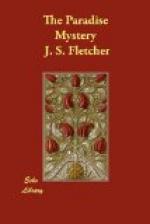“Don’t tell any more—don’t say anything—until you feel able,” she said. “You’re tired.”
“No!” answered Ransford. “I’d rather say what I have to say now—just now! I’ve wanted to tell both of you what all this was, what it meant, everything about it, and until today, until within the last few hours, it was impossible, because I didn’t know everything. Now I do! I even know more than I did an hour ago. Let me tell you now and have done with it. Sit down there, both of you, and listen.”
He pointed to a sofa near the hearth, and the brother and sister sat down, looking at him wonderingly. Instead of sitting down himself he leaned against the edge of the table, looking down at them.
“I shall have to tell you some sad things,” he said diffidently. “The only consolation is that it’s all over now, and certain matters are, or can be, cleared and you’ll have no more secrets. Nor shall I! I’ve had to keep this one jealously guarded for seventeen years! And I never thought it could be released as it has been, in this miserable and terrible fashion! But that’s done now, and nothing can help it. And now, to make everything plain, just prepare yourselves to hear something that, at first, sounds very trying. The man whom you’ve heard of as John Braden, who came to his death—by accident, as I now firmly believe—there in Paradise, was, in reality, John Brake—your father!”
Ransford looked at his two listeners anxiously as he told this. But he met no sign of undue surprise or emotion. Dick looked down at his toes with a little frown, as if he were trying to puzzle something out; Mary continued to watch Ransford with steady eyes.
“Your father—John Brake,” repeated Ransford, breathing more freely now that he had got the worst news out. “I must go back to the beginning to make things clear to you about him and your mother. He was a close friend of mine when we were young men in London; he a bank manager; I, just beginning my work. We used to spend our holidays together in Leicestershire. There we met your mother, whose name was Mary Bewery. He married her; I was his best man. They went to live in London, and from that time I did not see so much of them, only now and then. During those first years of his married life Brake made the acquaintance of a man who came from the same part of Leicestershire that we had met your mother in—a man named Falkiner Wraye. I may as well tell you that Falkiner Wraye and Stephen Folliot were one and the same person.”
Ransford paused, observing that Mary wished to ask a question.
“How long have you known that?” she asked.




